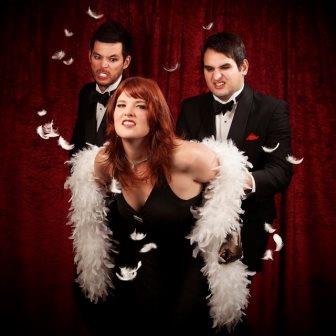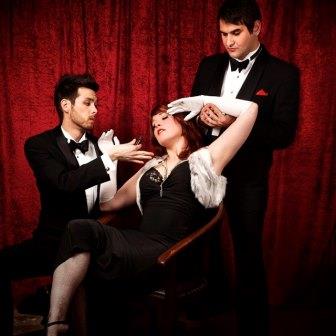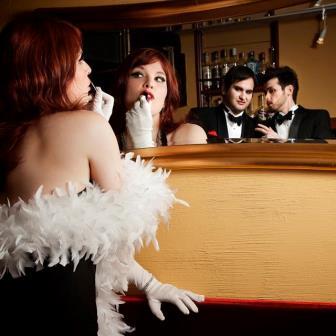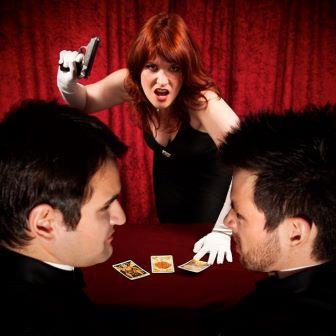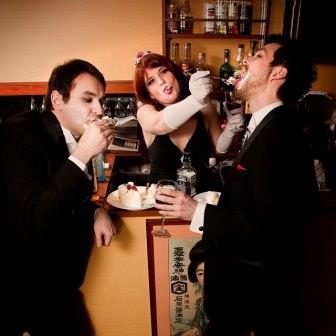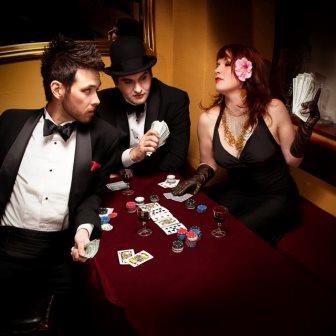
| |||||
|
Hailing from Australia, but making her home in Tokyo, Sorcha Chisholm makes music like a marriage between Hole and Sleater-Kinney with her band "Sorcha and the Sinners". She sat down recently with Laurier Tiernan to answer some questions for Punk Globe Magazine.
|
Punk Globe: Thank you for agreeing to do this interview.
SORCHA CHISHOLM: Of course.
Punk Globe: All your band members come from different countries. Where do you come from, and where do the rest of your band members come from?
SORCHA CHISHOLM: I'm from Australia, and I grew up in Adelaide in south Australia. My band comprises of 4 people. There's myself, and Dan Karras, who is American/Japanese/German. He comes from all sorts of different backgrounds, and he is an amazing drummer. He was raised in the States but he came over to Tokyo maybe 4 years ago. I've been here for 8. Arda Karaduman, he is from Turkey and he plays bass in the band. He's been here for 5 or 6 years, I think. So we got together, first Dan and I got together, and we decided to put the band together, and we were looking for a bass player. Arda came along and sealed the deal in 2011. In February, we did our first gig together. We gigged around, we did the record, and then in March of 2012 we had Fredd Danesin join the band (the lead guitarist) and he is from France. So, Australia, Turkey, the States and France.
Punk Globe: But Fredd is not on the album?
SORCHA CHISHOLM: Fredd is not on this particular album, but he has joined us for the live shows.
Punk Globe: Your band name is "Sorcha and the Sinners" which is eponymous because your name is "Sorcha", but where did the "Sinners" concept come from?
SORCHA CHISHOLM: The "Sinners" concept came a bit late because initially we were just gigging under my name, "Sorcha Chisholm," but then we realized that we needed a band name to cement our image, and what we were all about. So "The Sinners" came about. These epiphanies usually happen in the shower. [Laughs] I remember a light went on, "Sorcha and the Sinners! Of course!". Then everything just started rolling after that, right before we started recording in July of 2011.
Punk Globe: How did you and Daniel end up in Japan?
SORCHA CHISHOLM: I came here originally 8 years ago to work as an English instructor, but have since moved away from that to work as a freelance narrator, singer, and children's performer. I met Dan at one of Tokyo's expat bars (The Pink Cow) and we hit it off famously, and started doing acoustic shows together. I recognized him as an amazing talent on the drums. It occurred to me that I had never really rocked out before, and I really wanted to get a band together and record some of my heavier songs, some of which were written over 10 years ago. So we started rehearsing some of those songs together, just the two of us, with me on electric guitar. That was my first attempt to play electric, which was an interesting development. It really does charge you to take that instrument and to know how to play it well. Then we needed a bass player, someone who would pull it together in that regard. It took a few attempts. Bass players tend to be elusive creatures. Finally we met Arda, and he fit in beautifully. We started to rehearse at Noah Studios in Takadanobaba (north-western downtown Tokyo). One of our first rehearsals, Dan brought in his iPod and he said, "Sorcha, I REALLY think you need to hear this song. I heard it the other day and I thought 'I have to bring it to rehearsal to get the band in the mood'." He brought in his iPod and put on this song by Danzig called "Mother". I had never head such a song before, and it got me right in the bones, so Danzig ended up becoming our "Patron Sinner", and I think that kind of helped the band name to come through as well. We knew that we wanted to be a bit wicked in our ways.
Punk Globe: So it didn't come necessarily from a Christian upbringing that you were rebelling against?
SORCHA CHISHOLM: I think a little bit of sinning is always good for the soul. It helps to relieve the tension of always being a good girl. I kind of grew up with that "good girl" situation, and yes I did grow up with a Christian upbringing (Lutheran). I think I'm quite fascinated by the idea of what constitutes sin in this day and age, where many vices have become virtues, and in a philosophical context, how can you stretch your understanding of what is good and what is bad. Pretty much, it's up to the individual.
Punk Globe: Just a bit of a backtrack, (drummer) Daniel is Japanese-American. Did he come over to Japan of his own accord or was he following his family?
SORCHA CHISHOLM: He came over of his own accord because he was given the opportunity to come work over here, and he wanted to try his hand at something over here. I'm not exactly sure what that was.
Punk Globe: It's interesting to me that you said that you started off acoustic and just recently made the transition to electric, because one of the main pioneering bands of the sound I hear a lot of in your music is the Breeders, and Kim Deal was originally playing an acoustic guitar through a distortion pedal. It's interesting because it's kind of a bridge between the acoustic and electric, and I think you play in a similar rhythmic heavy fashion which is more typical of the acoustic guitar, but translates well to electric songs. How would you describe your sound?
SORCHA CHISHOLM: You are correct in saying that the songs sound as though they were originally composed on acoustic guitar, because they were, and I knew that they were very different from the other more melodic etherial music that I play, and I think that Kim Deal is definitely someone I admire. Also PJ Harvey was an amazing musical mentor for me, when I was in my late teens/early twenties, and I think that really informed my sound and my style. And I think that for this album in particular, I really wanted to go thick and heavy with sexy velvet undertones. But at the same time, not to be too suffocating, not to be too depressing. Melancholia can be a wonderful thing, but you don't want people to want to slit their wrists by the end of the record. I kept it quite light-hearted with a bit of a dark-comedy edge to it. There's one track called "Royal Jelly" which is right in the middle of the album, which is associated with the sin of gluttony, and wanting to have it all, and to hell with everybody. The sound that came together is kind of a discordant bee buzzing sound. I'm quite influenced by unconventional chords and rhythms. If something is going grab me, I will try and harness it into a song. It's interesting, the song writing process changes as you evolve over time, and a lot of these songs were written about 10 years ago. So, the sound I think is dark and beautiful. It's difficult when people say, "Describe your music". You know, it's like, have a listen. What do you think? How would you describe it?
Punk Globe: On that subject, I remember you saying that you were trying to not keep it too dark and heavy, that you were trying to keep some levity in the music. I actually originally heard your sound as like a mix of Hole and maybe something like Sleater-Kinney. So you've got the depressing heaviness of Hole, but you've got the levity and inviting aspect of Sleater-Kinney.
SORCHA CHISHOLM: Yeah, Sleater-Kinney have….oh, my God, here's a story if you want to hear a story. I was living in Melbourne and it was a cold dismal day, and I was sitting in my room listening to community radio, and this song came on, "Step Aside" from their album, "One Beat", and it just had this kind of infectious beat that I had to get up and dance it off, and the whole song is about dancing off your troubles, and I just fell in love with the band immediately and went to see them live when they came to Melbourne and everything, and that definitely colored my style as well. So, I love it when I hear women rocking out. It really makes me proud. The 90s were amazing for women in rock, and it was almost like this window opened. That was my formative time to be listening, and I was just hungry hungry hungry for different styles of music, and the women were just ruling it. I think, like everything, it goes in waves. Now you see people like Katy Perry and Lady Gaga, these megastars, and you might question whether they are legitimate or not, but what they've done is they've put themselves out there and they've opened up their voice, and I think that's really something, and I admire them for that. But, there should be more rocking women out there, playing their own instruments in particular. If you're going to be a musician, don't just hide behind your voice. Having an instrument seals the deal. You are a musician, not just a show pony.
Punk Globe: That brings me to another question. I've heard you say on stage before that you are a feminist. Let's make this a two-part question. 1) How much do you feel that feminism has influenced your music and 2) How much do you want to use your music as a vehicle for some of your ideals that might be feminist in nature?
SORCHA CHISHOLM: Oh, absolutely. I am a feminist, and I am proud of that, and it's constantly changing (my interpretation of feminism) along what's going on out there. I think that's the trouble with the world at large, is that they think that feminism is bra burning and man hating. It's like, no, that was the 1960s. That was 50 years ago. Feminism is still relevant today. My music, for me, is a medium for me to express my desires, my frustrations, my philosophies, and what's helped me to get through self-imposed suppression, or suppression from others or from society. Really, I can't complain. I'm a middle-class educated white woman, and I think that in order for me to really say that I'm a feminist, I need to use that to my advantage, to assist other people (women and men) to say, "Hey, everyone deserves a fair go." And while there still exists an imbalance in the world where women and girls are still prevented from getting an education or having a right to decide what goes on with their own bodies, or being prevented from having some kind of role to decide what goes on in their own countries, feminism will continue to be an important topic. So, yeah. I think that in my singing about that in themes of love, loss, family, all of those different universal themes, it's like it's a crusade. I'm a bit of a crusader for women's rights, but I have to be careful not to beat my chest over it, because that can turn people off, and I think that women's femininity is part of their power as well. We have power, and if you are regarding yourself as "power-less", then that's just a victim mentality. So, feminism to me means that I will take responsibility for my own power, and help others to realize their own.
SORCHA CHISHOLM: Good question. I still need to return to my acoustic solo work. Absolutely. The Sinners has definitely come through as this driving force, and it's my first real time playing with a band, and being the captain of the ship, and I feel so blessed to have the crew that I have, and I am (still) learning how to navigate it and work with it, but at the same time, being solo….it's my own affair, it's an intimacy that I like to have with the audience, that I feel… that with the band….the band is so bombastic… it covers the four corners, having four members…but the solo stuff…I feel like I can take off my "rock bitch" for a while and get back to being sensitive as well, and returning to those songs that are a bit more vulnerable, and in that vulnerability I can find strength as well. Being with the boys, I'm very in touch with my masculine side. I love it. I'm out there "rocking my cock" (my guitar). My pink guitar. But when I take to the piano or my acoustic guitar, it's a lot more feminine, and yeah, again it's the feminine power that I return to.
Punk Globe: How do you enjoy living in Tokyo, and in which parts of Tokyo do you all live?
SORCHA CHISHOLM: I love Tokyo. It is the most dynamic "surprise around every corner" kind of city. You never know what to expect. And the pace…it's like this surging…"Yes, keep striving! Keep doing stuff! Keep contributing to this city! Keep building this city!" I mean, 20,000,000 people here. It's crazy. I do get a little bit disorientated sometimes, but usually, that's the best way to find myself again. [Laughs]. I live in Shibuya, which is one of the most frenetic parts of Tokyo. There's all sorts of stuff coming out of there. We rehearse in Shibuya. I'm not sure where Dan and Fredd live, but they live somewhere close to there. We're all pretty close to the center.
Punk Globe: Had you learned any Japanese before you moved here?
SORCHA CHISHOLM: Not a lot. Just the basics. "Thank you." "Excuse me". "What is this?" ""Where is this?" [Laughs] I would have loved to have taken a course or something before I came to Japan, but then it was just a process of picking it up and taking myself to class every now and again, and having conversations with people. The Japanese are just incredible people. They will go out of their way to help you, and they love it when you try to speak their language. But often it's like you start talking to them in Japanese and then they start talking to you in English and you're like, "Can I not give you an English lesson? Can I get some Japanese?" But Tokyo is so…it's very easy to get around without Japanese, so I need to keep (my language abilities) up. And I really appreciate the natives who force me to speak their language. It's like if you move to France, you should be speaking French. I took the JPLT (Japanese Language Proficiency Test) level 3 a couple years ago. I go in waves. Sometimes I'm like study-study-study, but then I'll get lax and just run on what I know. The Japanese language is, I think, something I'd like to be more fluent at. If you understand a language, you understand the people better.
Punk Globe: You just released this eponymous album, "Sorcha and the Sinners". What are a few of your favorite tracks on there and why?
SORCHA CHISHOLM: Well, I like "Royal Jelly", and my best mate in the world did a saxophone solo on that one for me (Dandelion Jackson) and she's based in Melbourne. We did some file sharing over the interwebs, and she did an amazing job of providing this really sexy sax on that one. Very bee-like. Kind of like if you know Radiohead's "National Anthem". I love all of them. It's like, "Which of your children do you like best?" [Laughs]. Island Orchid, because that song encapsulates so much passion and confusion. It's a song that speaks of freedom to me. It's interesting. I wrote Island Orchid about 12 years ago, right after a breakup with a long-term partner, and I was kind of reeling and I wrote this song. The final verse makes reference to the orchid, and recently I just returned from a trip to Hawaii. So, the song was kind of prophetic in nature. I had to get to a phase in my life (to get to the point where I saw that) the island orchid is what it is. It can't be anything else. So, in a sense that's me. I am an autonomous creature in this world. And I am a beautiful creature, and it is important for me to recognize my own freedom. Another one I really like is "Tidal". It's really grunge, and this song is again about freedom and emotional turbulence, and disorientation, and figuring out where you are, and moving forward with your life after a time of being pulled under and being disconnected from yourself. So it's about returning to yourself. So most of the songs on the record start off quite dark and quite chaotic…this is a theme that I use a lot…it's therapy for me…and by the end of the song I've made my peace with it. It's not going to intimidate me anymore. It's also a phase in my life. A time in my life that I've been able to put somewhere, like a memory.
Punk Globe: What are some of your favorite venues to play in Tokyo?
SORCHA CHISHOLM: For "Sorcha and the Sinners", definitely the Crawfish in Akasaka. We're pretty much part of the paintwork there right now. I think about 80% of our shows have been held there, because the atmosphere is fantastic, the set-up is fantastic, the equipment is fantastic, the people who run the place are fantastic, and they are not going to rip you off like a lot of the bars in Tokyo will. They will cut a deal with you, as opposed to demanding that you pay up front. [Laughs]. The politics of doing shows in Tokyo, that's another interview entirely. We gig there quite a bit, and often do triple headliners with other bands like Inside Neon. We've gigged with them a lot. Fantastic band. Where else have we played? We played a really cool place called the Red Zone near Ikebukuro. La Mama in Shibuya is quite fun. Gamuso, in Asagaya, we've played at before. We did a gig in Osaka at the Hard Rock Café with Davina Robinson, and that was fantastic. She sings like a bat out of hell. That was one of the highlights of our year. It was for Pinktober (breast cancer awareness month).
Punk Globe: Have you played with any bands touring from Australia or anywhere else, or would you like to get on that type of thing?
SORCHA CHISHOLM: Sure. Absolutely. We'd like to get onto that. We haven't really gigged with touring bands yet. Mostly it's been the local scene, but absolutely, we'd love to get into that. So, it's just a matter of hooking up with managers or other bands. Right now we're managing ourselves and, you know, we're most certainly interested in having someone, if they're willing to help us out, management would be great. As I said, I'm the captain of this ship right now, but I'm a bit of a novice at the same time, but so far so good. I think we're doing pretty well. We've got a record, we're developing a fan base, we're sexy. [Laughs] You know, we're Sinners.
SORCHA CHISHOLM: Actually, yes. There are very tentative plans. I did talk to the guys about it. We haven't confirmed anything yet because we're all working different day jobs here in Tokyo. Taking time off is negotiable, depending on what our situations are. I'm pretty easy to up and go, because I'm freelance, as is Dan, but Arda works for an IT company and Fredd works at a university, so we would need to organize something. But, definitely, that would be amazing.
Punk Globe: Apart from Tokyo and Osaka, have you played anywhere else in Japan?
SORCHA CHISHOLM: We played up in Gunma, which is about 2 hours north of Tokyo. Some friends of mine run a Ski Lodge called "Canyons Outdoor Adventure Center". They do tours in the summer time, canyoning and such, and in the winter time they do ski tours and such. You can stay there and perform. In September of 2012 they invited the band to play, so we gigged up there and had a rocking show. There were some JET teachers up there who were a very receptive audience. They don't pay you, but they give you free food, lodging and recreation.
Punk Globe: Can you tell the readers of Punk Globe readers what some of your favorite bands in Japan are?
SORCHA CHISHOLM: Definitely Inside Neon. We love them. We love Superhero. They're fun. Japanese band. Their singer is like Japan's answer to Dave Grohl. Very sexy guy. Sawa's Phool. Fantastic band. Sawa is this tiny little bird woman who packs the biggest punch when she takes that guitar and starts singing. Our brothers, Melted. (Our bassist) Arda plays bass for them and they're quite fun. Kind of tongue-in-cheek indie rock. There are so many bands that we love. Kinlay Band. Their lead singer is kind of the reigning king (of the Tokyo indie scene) at the moment. The Mootekis. Ah, shit, have I forgotten anyone? [Laughs] It's interesting because since we started playing, it's like you become part of this family of expat bands, and obviously you gravitate towards the bands that you sound like. I guess that's the extent of it, but I've probably forgotten someone, and I'll probably feel guilty about it.
Punk Globe: Can you please give our readers your urls for your web presence so we can check you out online?
SORCHA CHISHOLM: http://www.sorchaandthesinners.com, http://reverbnation.com/sorchaandthesinners
The best thing is to go to the website first, and you've got all the little icons for all the other sites; facebook, reverberation, CD Baby, twitter.
SORCHA CHISHOLM: The limitation of space. Because I'm from Australia, and we have a tyranny of space, as we say. Coming here, and being forced into…you have no choice. You have to yield to everybody. So, I've become a master dodger and weaver. [Laughs} Also, maximization of space in your own home and everything. It's not for the faint-hearted. People who have issues with claustrophobia or agoraphobia probably would not like it here. But I find that I kind of get off on it, in a strange way. It's like we're all these little ants, and we're all like registering each other. I'm this redheaded white woman in a sea of black hair…and I'm pretty tall (5'8"). So you stand out, but I kind of like that. It's just the exhibitionist in me, I guess. The Japanese make it work. In the midst of all that chaos, there is order to it, and I really appreciate that. They know where they're supposed to be, and how they're supposed to behave. And everyone is super polite, or just very tolerant. But definitely the space issue got me first.
Punk Globe: You're a woman, and you say that Japanese people know how to behave, but here in Japan we have the phenomenon of "chikan" (businessmen groping women on crowded trains). As a woman, do you feel safer here, or in which ways do you think being a woman feels different for you here as opposed to in your home country?
SORCHA CHISHOLM: Good question! I feel very safe here. Tokyo brings out my anima. Anima? Animus? (My male part). I feel tougher here. I have gravity, and I've never been accosted by a chikan. I OWN my space. Going back to the space issue. It's like, "NO! You DON'T come past HERE!!!" [Laughs] And I've had a few, let's say, "mentally unstable people", drawn to me because I carry this energy. I have a big aura, as a friend once told me, and I think I might intimidate a lot of people. I don't mean to. It's just the way I hold myself. I'll stand with my shoulders back. I am not going to be a shrinking violet. So, I think the men (here) give me a wide berth. [Laughs] So, I feel safe here, because I put on this "don't fuck with me" kind of attitude. Compared to other countries, I think it's just how you feel within your own space. As I said, I was in Hawaii recently, which is the States, so there was this friendly atmosphere, but there was always this undercurrent of suspicion and paranoia, and I'm like, "no, I'm not about that. I'm cool." [Laughs] But, don't fuck with me. [Laughs] I would advise every woman to own their space. That goes back to feminism as well. The chikan problem here in Tokyo, I could talk about it for hours, but it basically happens when the respect is blurred. Japan has a very interesting culture of sexuality, very different from the West as well. And I'm not going to go all moralistic on it, because I'm not about morals, I like to be "immoral". [Laughs] I think that women and men….you are your own creature, and how you protect yourself is very important, and how you respect yourself is really important. And that's your own safety.
Punk Globe: What do you think the difference is between playing shows in Australia compared to here in Japan.
SORCHA CHISHOLM: Japanese audiences can be a bit difficult to move, because they're a bit more reserved. Australian audiences are a lot more boisterous, and they will heckle you as well. And you have to hold your own. And if you suck, you will be told that you suck. And so I think that fortunately I was just a bedroom singer for a long time, playing for friends and relatives, until I got to the point where, based on their reactions, I felt that I was good enough to take it to the stage. For the most part I had a really good experience in Australia, as an acoustic performer. Melbourne is where I cut my teeth. That was an amazing town for music. The Japanese can be a bit reluctant to get into it, but once they get it, they're right in there. It's fantastic. It's an interesting contrast. I think I'm getting better, again, at owning the space, because the stage is another reality, because you're creating this sound. It's drama, and so it's important that you are completely present in that. Some days some gigs will be great, and you'll be rocking it and everyone's into it, and other days you might be a bit low in energy, and it might go over peoples' heads, and that's fine, but, as long as you're absolutely there, and believing what you're singing and playing, and you're in tune with your band mates...Yeah, that's another thing too.
Punk Globe: You just released this eponymous CD, but do you already have other plans for further recordings?
SORCHA CHISHOLM: Yes, because Fredd wasn't on this CD, and he's an incredible guitarist. He's almost too good for us. It's like, "What are you doing with us, man?" [Laughs] And we've got some plans to record some of my songs from records past, which we have translated into the band. We want to record Sorcha and the Sinners version of old Sorcha acoustic songs, plus another new one. It should be like a mini EP, hopefully put out in 2013.
SORCHA CHISHOLM: I find it pretty revolting actually. [Laughs] It's a complicated industry in Japan. Compared to my opportunities growing up in Australia, girls here from the start are set up for a very limited amount of opportunities before they are expected to get married and have children. That's still a very very strong cultural imperative for women in Japan. That's changing though, because I've been reading that more and more women are choosing not to get married. They're choosing not to have families, because they are enjoying their financial independence. However I think that a lot of them are deluded by how important their image is; needing to look sexy all the time, or having to look sexually available, or like a little girl. Again, it goes back to the femininity. Again, as a feminist, I want to use my femininity as a way to help me feel confident, and show what I think of myself. Japanese women are very mysterious creatures. I do have a few Japanese female friends. A lot of the time they are very inscrutable, and a lot of the time it's difficult for me to "get" them, to really understand what they're on about, or what their heart's desires are. But I'm optimistic that there's this new wave of women's power coming through into the world right now, and I think that men who see that as an opportunity to invest in women, rather than wishing to possess them, the ones who want to invest in them will be the ones who will be taking the world to a better place.
Punk Globe: Thank you very much for doing this interview. Do you have any last words for the readers of Punk Globe?
SORCHA CHISHOLM: Last words? Yeah, "Rock it like a sinner, man!!!"
|
|
|
